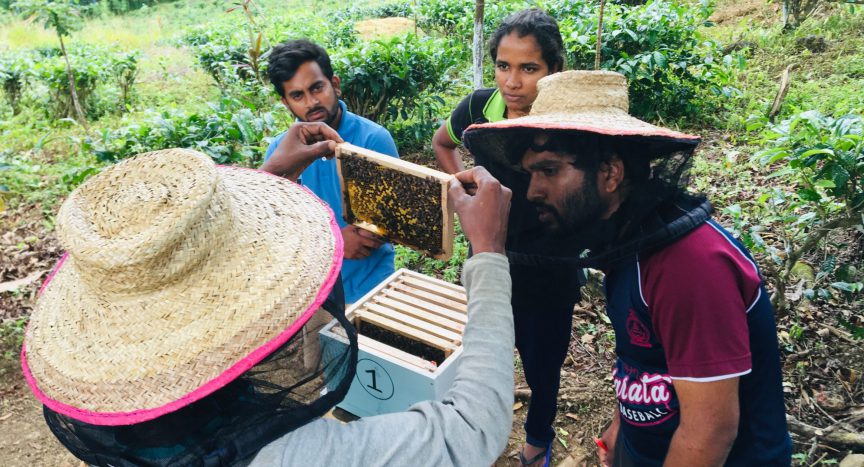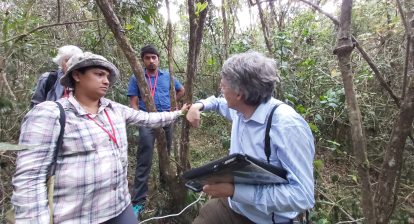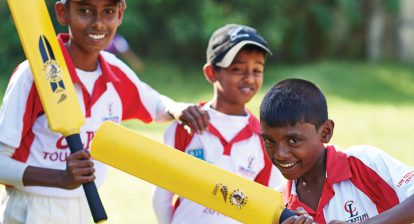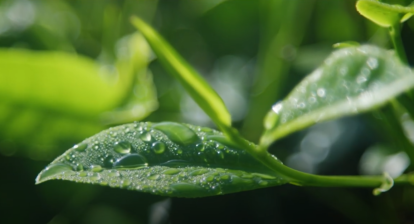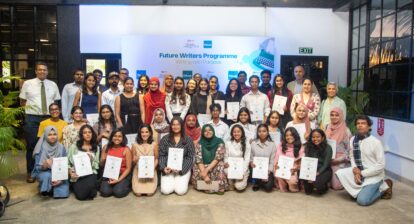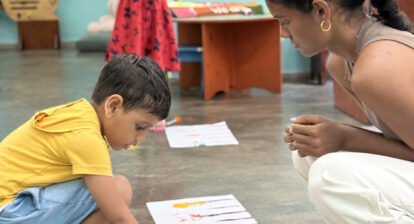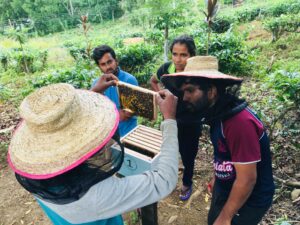
Inspecting bee box
Useful for sustainable agriculture and upholding ecosystem services, bees are an important link to biodiversity and human well being. But, the widespread use of pesticides and fertilizer, habitat destruction, and climate change threaten the future of bees and other pollinators and insects.
Therefore, pollinator-friendly actions from government policy down to individual action are important. Begun in 2020, Dilmah Tea’s Bee A Keeper Project driven through its conservation and environmental sustainability arm Dilmah Conservation. Here the aim is to conserve Sri Lankan honeybee population through research, education, community involvement and economic upliftment while researching innovating tools such as payment for ecosystems in corporate environmental projects.
Bee A Keeper Program
Aiming to increase the biodiversity in the tea gardens and bolster biodiversity research, Bee A Keeper Program falls under the conservation and sustainability arm of Dilmah Tea that has several centres in Sri Lanka committed to creating a better tea for people and planet. Bee A Keeper, having several trajectories such as bee research and community beekeeping are each carried out at a designated centre.
Bee Research
At the Climate Change Centre in Nawalapitiya, dedicated for climate research, the focus is on bee research. Endana Centre whose flagship project is building a nature corridor, adopts community sustainable beekeeping to involve the community in conserving their home gardens and the neighbouring forest. Incidentally, th cumulative ecological wealth of the Endana Nature Corridor is at USD 382,362. Both Endana and the Nawalapitiya centres conduct beekeeping training workshops for the community and other interested parties.
Bee Education
Education and awareness are important for the success of conserving bees. Dr Anura Indrajith Sirisena Entomologist at the Rajarata University of Sri Lanka and chief advisor for the Bee a Keeper project said, “In community beekeeping we are interested in getting the involvement of the farmers. Through this they come to realize the importance of bees and why we need to conserve them. Further they learn sustainable techniques needed to conserve bees.”
During the pandemic (2021), Dr Sirisena curated and delivered a webinar series “Friendly Beekeeper” organized by Dilmah Conservation to introduce beekeeping. With over 300 participants registering, the series was a success. The recorded sessions of Friendly Beekeeper are found on the Dilmah Tea YouTube channel.
Among the research focus of the program some of the interest areas have been monitoring bee decline, addressing the lack of taxonomic information on bees, assessing the economic value and impact apiculture, evaluating the status of wild bee populations, and studying the chemistry of honey variants.
Apitourism
The future plan is to increase its volume of training programs for locals in the area and for the hospitality sector that can benefit from apitourism. An extension of ecotourism, apitourism ranges from site tours, tasting experiences to safely engaging in beekeeping. It is one of the aims of the project to make sustainable beekeeping popular in Sri Lankan ecotourism niche thereby indirectly strengthening sustainable beekeeping.
Dilmah was founded on the knowledge of its enduring connection to the land and the surrounding communities in which it operates. Dilmah Conservation is a symbol of Dilmah’s comprehensive commitment to minimizing its impact on the planet, to fostering respect for the environment and ensuring its protection by encouraging a harmonious co-existence of man and nature and the sustainable use of the environment.

